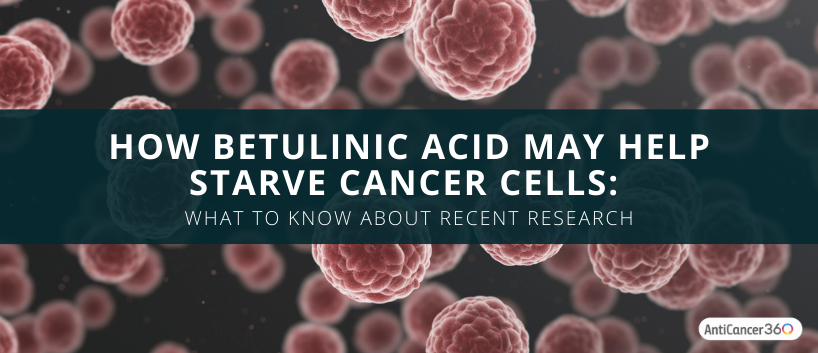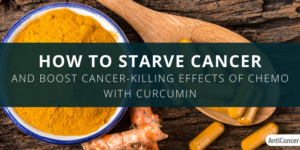White birch trees are often admired for their unique beauty. But beyond appearance, the bark and leaves of white birch trees contain active compounds. These include betulinic acid, betulin, flavonoids, and quercetin, among others, which are known for their medicinal and potentially anticancer benefits [1].
When you’re fighting cancer, it’s important to support your body in every way possible. Adding certain natural substances to your treatment plan may be a valuable strategy to consider.
The potential benefit can often exceed the risks, depending on your condition. This is especially essential for aggressive and late-stage cancers.
Fortunately, there are many strategies that you can consider and incorporate in a way that doesn’t interfere with your oncologist’s treatments. And, nature has provided us with many anticancer substances that can help you fight cancer from every possible angle.
So in today’s post, we’ll show you the science behind betulinic acid’s anticancer potential and how you might consider integrating this substance into your plan.
What is Betulinic Acid?
White birch tree bark was used for thousands of years by ancient civilizations for its apparent ability to treat inflammation and parasites. Betulinic acid is a substance found abundantly in the bark and leaves of this tree. It’s located in hundreds of other types of trees and plants as well [2].

Betulinic acid was discovered to have selective cell-killing (cytotoxic) effects on melanoma cells in the 1990s [3]. Many studies have since shown its cytotoxic effects on many different types of cancer cells, including leukemia, head and neck, prostate, ovary, cervical, breast, lung, colorectal, liver, pancreas, thyroid, brain, and several other cancers [4].
Keep in mind that most anticancer research on betulinic acid is preclinical research. This means that most scientific experiments with betulinic acid involve studying its effects on cells in a laboratory. These cells may be human cancer cells studied in Petri dishes or test tubes under microscopes.
Laboratory studies are performed to learn about anticancer effects to explore their potential application to humans. But first, they often use animal models, such as mice. It’s important to know that not all preclinical study results will show the same results in humans. But preclinical studies are still helpful, especially when showing potential anticancer benefits and no safety concerns in animals.
Some clinical (human) studies to study the anticancer effects of betulinic acid are ongoing. Some clinical studies were never finished, possibly due to lack of funding [5].
Our outlook is that when you’re facing advanced or resistant cancers, it’s not always possible to wait for clinical trials to conclude and for the results to be published. And, if your case is incredibly challenging, then our advice is to consider fighting your cancer from every angle, including the use of natural supplements. We recommend incorporating them in a safe way that doesn’t interfere with your other cancer treatments.
So, next, we’ll take a closer look at the potential anticancer effects of betulinic acid.
How to Starve Cancer with Betulinic Acid: Cancer Metabolism Suppression
Cancer metabolism refers to the processes that cancer cells use to make energy. One critical cancer-fighting strategy is to block or restrict the flow of sugar, fats, and proteins to cancer cells.
This strategy weakens the cancer cells and may make them more vulnerable to cancer treatments. Fortunately, many natural substances show potential in blocking cancer’s metabolic processes, including betulinic acid.
Betulinic Acid May Help Starve Cancer Cells by Blocking the Conversion of Sugar to Energy
Targeting cancer’s sugar-related metabolism can be a critical cancer-fighting strategy. This effectively starves cancer cells of the sugar they require to fuel their high growth and proliferation rate.
Studies of betulinic acid have shown its apparent ability to reprogram the glucose (sugar) metabolism of colon cancer cells. Exposure to betulinic acid appeared to enhance the rate of sugar metabolism in these cells, to the point of a so-called “absolute addiction to glycolysis.” [6]
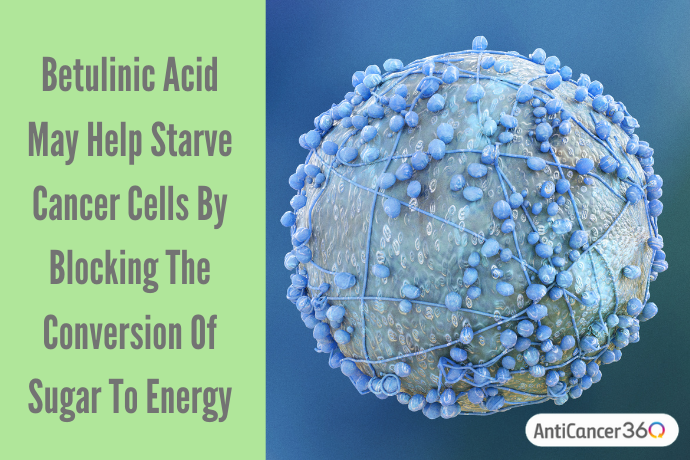
This 2014 study suggested that betulinic acid seemed to trigger cell death (apoptosis) selectively in colon cancer cells, but not in healthy cells. The authors’ interesting theory is that betulinic acid could make cancer cells overly addicted to glycolysis (the process of breaking down sugar). This leads to ultra-rapid consumption of the sugar available, but once it runs out, cell death occurs [7].
A 2019 study showed that betulinic acid blocked (inhibited) glycolysis enzymes in highly aggressive breast cancer cells. The researchers learned that betulinic acid seemed to slow the migration (spread) of the breast cancer cells [8]. This finding highlights the potential for betulinic acid to play a role in possible metastasis prevention. (Metastasis is the spread of cancer from its original location to other areas of the body.)

These authors also studied the effects of betulinic acid on breast cancer cells in mice. Their findings confirmed that exposure to betulinic acid killed the cancer cells, but had no harmful impact on normal cells. Even when the researchers increased to very high doses of betulinic acid, no noticeable adverse side effects were observed [9].
Recent studies have also linked betulinic acid’s effects on glucose metabolism to lipogenesis. Lipogenesis is the metabolic process of generating fats. Next, we’ll take a closer look at these studies and how betulinic acid might interfere with fat metabolism in cancer cells.
Betulinic acid Can Interrupt Cancer Metabolism of Fats
Another way that betulinic acid helps to starve cancer is by interfering with the way cancer cells metabolize fats.
Fats (such as lipids, fatty acids, and cholesterol) are essential energy sources for all living cells. The metabolism of fats affects many important cellular processes, including cell growth, proliferation, and survival. Consequently, the reprogramming of fatty acid metabolism plays a critical role in cancer progression.
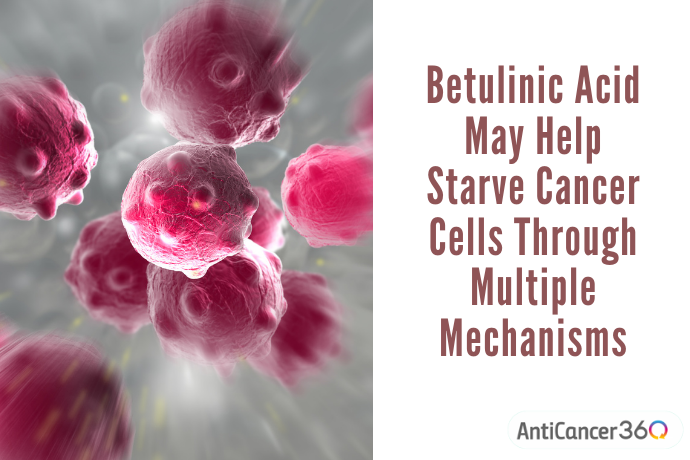
With their rapid rate of growth and multiplication, cancer cells require high levels of lipogenesis (the metabolic process of building fats). And, fats are used in constructing the cell membranes that surround all animal cells.
Scientists have shown that betulinic acid plays a role in a metabolic signaling pathway known as the AMP-activated kinase (AMPK) pathway [10]. Exposure to betulinic acid appears to activate the AMPK pathway, which in turn reduces the activity of a specific enzyme in cancer cells. This enzyme is known as acetyl-CoA carboxylase (ACC) [11]. ACC normally functions to generate fats.
So, let’s recap this anticancer effect of betulinic acid. When cancer cells are exposed to betulinic acid (in a lab setting), the ACC enzyme gets slowed down. Without the ACC enzyme acting at its usual rapid speed, the cancer cells can’t quickly produce fats, which reduces their growth. This feature of betulinic acid and its effects on glucose metabolism show this natural substance’s potential to fight invasive cancers [12].
Betulinic acid may also play a role in other aspects of cancer fat metabolism. Sterol regulating end binding proteins (SREBPs) are involved in the production of lipids, especially cholesterol. Cholesterol is a precursor to hormone production, to which many cancers are sensitive.
Betulin, a natural substance similar to betulinic acid and found in white birch tree bark, seems to block SREBPs. Another study in kidney cancer cells (clear cell renal cell carcinoma) showed that betulin blocked SREBP1 and SREBP2, resulting in decreased cancer growth and proliferation [13]. Betulin’s effects on SREBPs have also been observed with other cancer cell types and clearly demonstrates its anticancer potential [14].
An exciting 2019 lab study showed that betulin enhanced the cancer-killing effects of a drug, sorafenib (Nexavar), in liver cancer cells. The scientific analysis showed that these results were likely attributed to betulin’s blocking effects on glycolysis and SREBP1 [15].
It’s also interesting to compare betulin’s cell-killing effects on some cancer cells to its apparent healing effects on non-cancer cells. Here’s just one example. A 2019 clinical trial evaluated the use of betulin gel applied to burn wounds in adults. The results showed that those who used betulin gel had a significantly higher rate of accelerated wound healing (85%) compared to people who used a hydrating gel without betulin (14%) [16].

Study participants reported no side effects. No safety concerns were observed during the year-long use of betulin gel in this trial [17].
So, just as betulinic acid interferes with cancer cell sugar metabolism, its effect on cancer cell fat metabolism contributes to this substance’s potential. Especially its potential in starving cancer cells of the nutrients they require to grow, divide, and multiply.
Next, we’ll show you how betulinic acid may starve cancer cells of another valued resource: protein.
Betulinic acid May Block Cancer Metabolism of Glutamine
When some cancers are starved of sugar and fats, they can adapt. They’ll redirect to get their energy from glutamine, the most abundant amino acid in our bodies. Amino acids are the building blocks of proteins, and proteins have many essential functions in our bodies’ cells.
Tumor cells demand a high level of glutamine metabolism. Therefore, finding ways to interfere with cancer cell glutamine metabolism is a logical pursuit of cancer treatment development.
Betulinic acid may help to target a glutamine metabolism pathway called the mammalian target of rapamycin (mTOR).
mTOR is an enzyme that is recognized as a key regulator of animal growth and is a crucial link between metabolic control and nutrient availability. Scientists have learned that the mTOR pathway is activated during tumor initiation and gets out of control in cancer.
A 2020 study reported findings that betulinic acid blocked the mTOR-signaling pathway in pancreatic cancer cell lines. The scientists observed that applying increasing doses of betulinic acid to pancreatic cancer cells led to increased rates of cell death. After 24 hours, cancer cell death rates were greater than 37% [18].
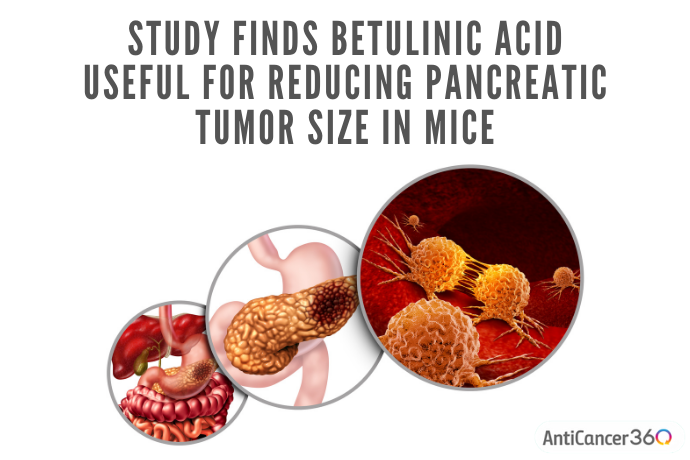
Next, these researchers compared two groups of mice with pancreatic tumors of the same initial size. One group of mice received betulinic acid, and the control group received no treatment. After 30 days, the mice treated with betulinic acid had significantly decreased tumor size, on average, compared to the control group [19].
Their analysis revealed that blocking the mTOR pathway was a key factor in betulinic acid’s anticancer mechanism of action [20].
How To Use Betulinic acid: Dosages, Side Effects, and Precautions
Dosage
White birch tree bark extracts containing betulinic acid and betulin are available in a range of dosage forms and strengths. The optimal dosage for the use of betulinic acid for its potential anticancer effects hasn’t been established [21].
Follow the product’s labeling for dosage guidance or consult with your healthcare professional.
Side Effects
Betulinic acid is generally considered safe. No major side effects have been reported [22].
It would be best if you considered the following precautions before starting a supplement with betulinic acid [23]:
- Allergic reactions. Birch pollen can cause allergic reactions in people with sensitivities to pollen or related trees.
- Mild diuretic effect. Betulinic acid might cause mild changes in how much urine your body produces. Be sure to stay well-hydrated after starting a supplement containing betulinic acid. If you have a history of high blood pressure, it may be a good idea to monitor your blood pressure daily after starting a betulinic acid supplement.
Interactions with Drugs and Supplements
Betulinic acid isn’t known to have any significant interactions with prescription drugs and other natural supplements [24].

There could be possible unknown drug interactions that could happen with betulinic acid, especially with chemotherapy or other cancer treatments.
Because of this, you should consult with your doctor or pharmacist before including any supplements in your program. Please share your updated medication and supplement list with your healthcare provider whenever a new addition is considered.
Betulinic Acid May Be A Potentially Powerful Anticancer Tool
Always discuss the risk-versus-benefit potential with your healthcare professional before starting any natural supplements, including betulinic acid.
Overall, you can see that there can be many potential benefits to adding a supplement like betulinic acid to your anticancer program to help you fight cancer from every direction.

Ultimately, when using an “Aggressive Integrative Approach” to cancer, the goal is to fight cancer from every possible direction. This approach includes integrating the use of natural supplements to fight cancer based on available evidence, despite limited human data… and doing it in a way that won’t interfere with your oncology treatments.
How are you approaching your cancer treatments? Are you taking any natural or dietary supplements? Have you tried a white birch extract or other supplement with betulinic acid? Have you made any other lifestyle changes that have made a noticeable difference in your fight against cancer? Please let us know in the comments below!
Are You A Good Candidate For Our Program?
If you’d like to learn more about the AntiCancer360 approach and see if we can help you… either click here to schedule a free call to discuss your case in more detail, or watch our free online webinar to learn more about our approach.
Dr. Patricia Weiser is one of AntiCancer360’s consultant pharmacists, science advisors, and medical writers. Her expertise helps us create safe herbal and supplement combinations and avoid potential drug interactions.
Patricia is a graduate of the University of Pittsburgh and a licensed pharmacist. She has clinical experience in both community and hospital pharmacy. She is passionate about integrative and preventative care and strives to empower her patients to take an active role in their health.

